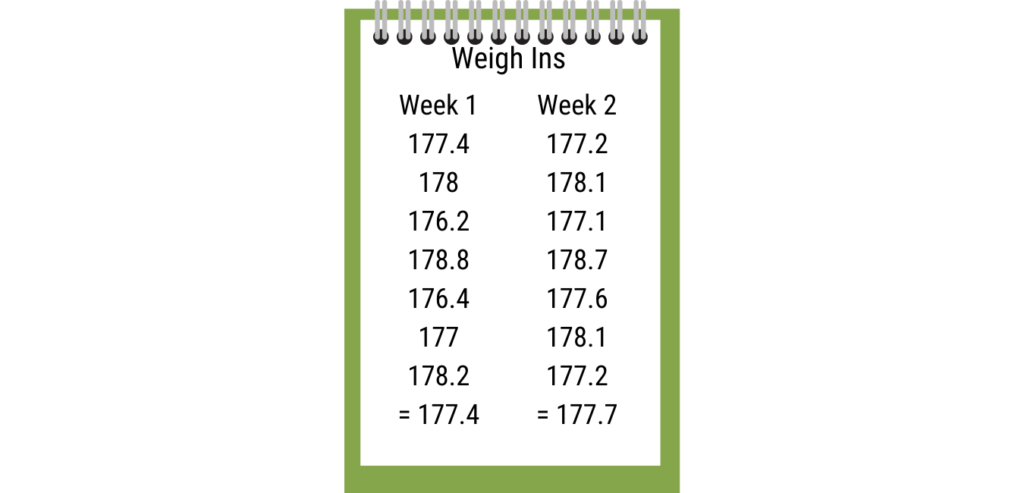You have probably arrived here to find out how many calories maintain weight after a recent dieting period. And it is a very smart question. Because it is what will allow you to maintain your results with ease and to feel and perform at your very best every single day going forward. But this question hasn’t a one size fits all answer and can take a little trial and error to figure out your specific requirements. Now, you can get a quick estimation via the following two methods. However, we’ll save the most accurate one for last.
How Many Calories Maintain Weight Quick Calculation
So, to get a quick estimation to go off multiply your bodyweight in pounds by 15-17. For example; my stats at 178 pounds x 17 = 3,026 which these days is roughly my maintenance calories. But it get’s a little tricky because everyone has different levels of daily movement. In addition, you can have someone working on a construction site on their feet and lifting all day versus an office worker. And this can mean a big difference in terms of energy expended.
Further, if I lead a sedentary lifestyle with little to no exercise I would require circa 2,200-2,300 calories to maintain my weight as a 174 cm male. On the other hand when exercising moderately (3-5 times per week) this changes to around 2,900-3,000 calories. Also, having more muscle mass (if you’ve been strength training for years) will require the higher end calculations. Contrarily, if you are starting out it’s better to choose the lower multiplication. Both multiplications will assume you’re exercising 3-5 times weekly.
How Many Calories Maintain Weight calculator
You could also pop over to this calorie calculator which includes a body fat estimation (if scroll right down the page) for more relevant accuracy. Although this still doesn’t mean it is specific to you but is a good estimation to start with!
The Most Accurate Way to know How Many Calories Maintain Weight
Firstly, what is measured can be managed! So, to find out your exact maintenance calories you’ll need a few things:
Digital body weight scales
Digital food scales
My Fitness Pal (food/macros tracker)
In addition, you must weigh yourself every morning first thing, after the loo and in minimal clothing (random weigh ins are much less reliable). As well as track and consume the same calories/macros every day for a 2 week period. Because if you don’t the scales will be invalidated due to food intake being inconsistent. So, choose your calorie target for the next 2 weeks (via the calculator) and aim to have similar macros (protein, fats, carbs) each day. Thus, with macros being consistent your water and carbohydrate fluctuations will be minimized.
So, what is of concern to us is your average weight and calories consumed across a 2 week period. And this average get’s rid of any water/carbohydrate ‘noise’ or scale daily fluctuations. Also, it’s a very simple process. Because all we need to do is add together our week one weigh ins and then our week two weigh ins. Then we simply divide both weeks by 7 days and compare them against each other. If we are heavier in week 2, we’re eating too much.
Fire to the Furnace
Furthermore, this gives us exact specific personal data that teaches us whether we are eating enough, not enough or too much. Because we will have either maintained, lost or gained weight. Then it’s a case of remaining at the same, adding more or pulling back on the current calorie target. Also, the goal is to be as realistic and as honest as possible to replicate normal eating. For example, if you track well through the week but not at the weekend it’s not going to be as accurate. Ideally, choose a period where social events are lower or less frequent. And if you don’t get the full 14 days of tracking in, you can still divide by the amount you have tracked over the 2 weeks. But the days not tracked must be similar to a typical eating day, not blow out days.
Average Weight Across Two Weeks
So, firstly you’ll want to add the first 7 days of weigh ins together and then divide by 7. Then, do the same again for the following week and see if there are any differences.

Basically, there are 3,500 calories in one pound of fat which equates to 500 calories above maintenance every day (500 x 7 = 3,500). So, if we over ate by 500 calories every day we would have gained a whole pound and hit a new bodyweight of 178.4 pounds. But we didn’t over eat by that much. Because the difference above from week one to week two is only 0.3 not 1.0.
Therefore, 0.3 (what we gained) multiplied by 3,500 (1 pound of fat) = 1,050 (1,166 is one third a pound of fat)
So, 1050 calories divided by 7 days = a 150 daily calorie surplus (we must reduce our current calorie target by 150 per day)
Reverse Diet Weight Gain
Now, the above data is the willy wonka ticket to all goals! Whether fat loss, fitness or muscle gain. Because there is no longer guess work involved but tailored plans. However, if this process is a little too much effort for you, you can just keep an eye on the scales over monthly periods (more weigh ins equal more data). And if you find your weight on an upward spiral, simply pull back by 100-200 calories per day (until your weight stagnates). Especially if you consistently weigh in at around 4-5 pounds above last months lows (discounting TOM). But, keep in mind that we can gain 4-5 pounds of water/carbohydrate weight as we raise our calories when exiting a diet phase! So, once you hydrate out of your diet and gain this initial weight you then want to keep an eye on the scales from there (as well as images/measurements).
Maintenance Calories Benefits
In our experience of working with clients for 12+ years we’ve found that many stay in chronic calorie deficits. And on occasion come out of them briefly via binges. Instead of having phases of structured dieting. For example; an 8 week diet push versus a 1-2 week break. As a consequence of chronic dieting, our fat loss phases become short in length and include less calories for less results. So, make it much harder than necessary and much less economical. Basically, chronic dieting sucks and brings plenty of side effects too. Such as:
Compromised metabolism and hormone profiles (Ghrelin/Leptin)
Reduced motivation, energy and mood
Low libido
Food obsessiveness, more hunger before food and less satiation after food
Poor performance and potential muscle atrophy
Poor sleep and productivity
Longer recovery required between sessions
Sub optimal health profile due to insufficient nutrients (opposite of anti ageing!)
Despite this topic not being as sexy as dropping fat we can see it’s importance. People purchase all the anti ageing creams and potions in the world. But don’t eat the amount of calories their body needs on a daily basis which is the most powerful anti ageing factor there is.
Tracking Calories Means No Deprivation
Now that you know this information on how many calories maintain weight you can experience maintaining your goals with ease. In addition, one huge benefit to knowing how many calories maintain weight is it allows you to incorporate a little guilt free junk food without going over your calories. And this is liberating because so many chronically diet and never enjoy any favorite foods as they think they’ll blow up. Also, it’s usually this deprivation that makes people give in and binge anyway. So, junk food in and of itself isn’t to blame for making us fat. But lack of method and knowledge definitely are.
At Body Reach we know from experience that returning back to normal eating can be very stressful for most with the worry of weight gain etcetera. So, contact us if you would like more information on how our online services can help you.

